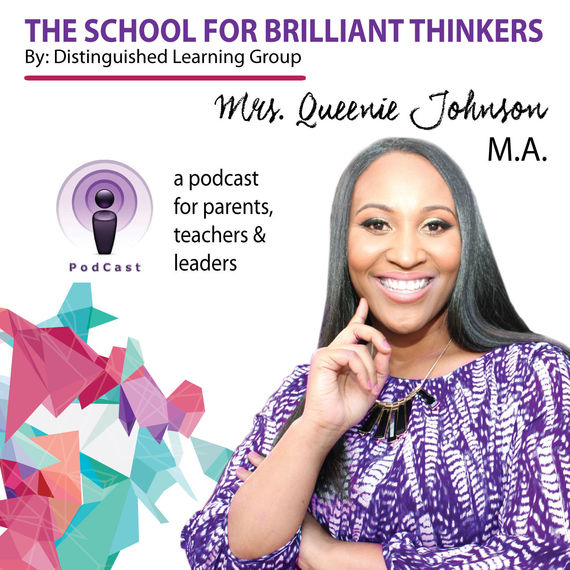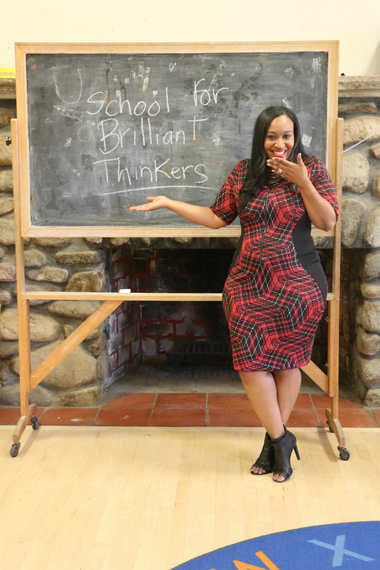
I first heard of Mrs. Queenie Johnson, M.A. through an amazing Brand Church Periscope, and I was instantly hooked by her charisma and knowledge when it came to branding, teaching, and parenting.
In this interview, you will learn from an educator of 11 years about how you can naturally motivate your child so they WANT to learn instead of you having to drag them kicking and screaming to do something they would otherwise be naturally passionate about.
Hi Queenie, thanks so much for being on this interview, can you tell us about yourself?
I run the School for Brilliant Thinkers-an entrepreneurial and leadership Development Company for learners of all ages.
We offer personal development tracks for creative moms, children, college students and corporations.
I also work closely with celebrity parents to manage their child's education plan.
I taught in the classroom for 11 years and have a progressive/humanistic education background.
What are some ways that teachers are actually draining motivation from children?
One of the 10th graders that work with said it best, "Ms. Queenie, I should be going to school with questions, not answers."
This blew my mind. I actually stopped tutoring and wrote down his quote.
He continued, "I should spend time at home being curious about the topic we are working on in school and go to school the next day excited with more questions, not giving answers that the teacher has already determined to be true."
This captures what's draining students-They feel stifled.
They know their ideas aren't valued.
It's draining and de-motivating.
How can we naturally motivate children?
The national conversation is geared around the question, how can we motivate students?
A better question to ask is--what are we asking students to learn, and why?
Is it meaningful to them? What experiences can I create for students to immerse themselves in the learning process?
Teachers must understand that children are naturally wired to learn.
Curiosity is their natural tendency.
What children need is compelling content- dramatic stories that draw them in and impel them to think about how humans grow, learn, change and have disrupt systems over time and the impact that has on their individual freedoms and society.
We struggle nationally with what appears to be "motivation," but motivation isn't the issue.
The issue lies in our misunderstanding of the goal of compulsory education.
Compulsory education was created to prepare students to work in factories which later became fancy buildings called corporations.
You cannot motivate a child to learn when you have your own motive and hidden agenda of what you want them to learn.
Preparing children to get a job can no longer be the aim of school. (Yep! I said it.)
Because of our highly connected society, students can see that it doesn't take knowing algebra to be successful in life.
The internet has also given us access to knowledge that was once gated in the corridors of ivory towers and the local public library.
With open source education, the instability of jobs, and the collapsing of corporations; students simply aren't motivated by the idea of "getting a job."
They dream of creating, innovating, problem-solving and being the next BIG thing!
In the past you could say you need to learn this so you can get a job; nowadays that's simply not true.
The aim of school must be to engage the heart, prepare the soul, and activate the spirit of inquiry.
Schools that seek to teach for job development, ask, "What do the students need to know to be job and career ready?"
Schools that focus on developing the innate capacities of a child ask, "What experiences/opportunities do our students need exposure to in order to develop their leadership and creative power?"
Depending on the educational philosophy, motivation can be viewed differently.
I've always taught my students from K-12 that our goal of school is to develop their creative power. However, creativity is the linchpin for developing the career and life they want, nonetheless creativity is developed through understanding an array of topics.
All creators, musicians, mathematicians, biologist and consultants, are able to leave their imprint on the world because they have knowledge of how the world works. Once they understand why, they tend to crave knowledge and see school through a FRESH new lens.
Do you have an example that stands out in your mind?
When I taught a first/second grade combination class, I wanted to introduce my students to the Harlem Renaissance.
We spent an entire week exploring the concept of action, developing quality questions generated by the students and as I introduced the Harlem Renaissance students were captivated, and intrigued.
Each question the students brought to the table we explored all while hitting our content standards.
Guess what else happened?
My student, who was 8 at the time, asked her mom to take her to New York for Spring Break.
What happened next was nothing short of amazing: She documented the entire experience, from the subway ride, to the cotton club, gaining access to the famous Apollo Theater.
When she returned to school we had a viewing party with our class to see her self-directed learning experience.
What can educators do today to improve their students' motivations?
This is not an exhaustive list but these come to mind:
- Care for the spirit and the soul of the child to create trust.
- Use empathy as a tool to understand your student's heart.
- Share your wins & losses to create a human-centered experience.
- Create an environment where students feel safe to share their failures.
- See them as whole, knowing beings ready to discover their hero's journey.
- Ask your students about their ideas, what they want to learn about and if they have ideas about how to get there. (You'd be surprised to learn that students have incredible ideas)
- Motivation is stirred when a child feels safe.
How can we get in contact with you?
You can find me at www.TheSchoolforBrilliantThinkers.com or email me at mrsqueeniejohnson@gmail.com


